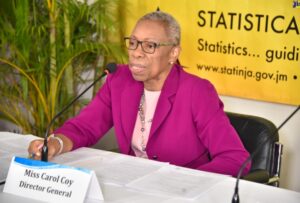
Climate change no hoax for Caribbean people, says NCU president
Northern Caribbean University (NCU) President Professor Lincoln Edwards has stated that climate change is not a hoax for people living in the Caribbean, as their lives have been affected in adverse ways by effects such as rising sea levels and super hurricanes.
Addressing the October 16-19 Canada-Caribbean Institute Research Symposium, Professor Edwards pointed to rising prices and scarcity of agricultural produce due to the impact of Hurricane Beryl, which passed through the Caribbean on its destructive path to the United States in July of this year.
“The banana crops have been devastated so we will all need to await the equivalent of the gestational period of a human being before seeing the revival of the banana industry,” said Edwards, who is co-chair of the Canada-Caribbean Institute (CCI) alongside Dr David Farrar, president of McMaster University in Hamilton, Ontario, Canada.
Professor Edwards told the symposium that NCU’s main campus in central Jamaica sustained $280 million in damage from the hurricane. Furthermore, a nearby laboratory school, Victor Dixon High, is still without a roof, which is the state of several public schools during the current rainy season.
In welcoming participants to the symposium, held under the theme ‘Climate Crisis, Resilience, and Alternative Energy Sources’, Professor Edwards said that “rising temperatures and marked global warming, the melting of major ice caps, the bleaching of the coral reefs, more extensive and frequent storms and wildfires and the emergence of new diseases are a threat to all of us”.
He invited the audience of academics and policymakers from across Canada and the Caribbean to join the worldwide effort to realise the United Nations 2030 Sustainable Development Goals. These include reducing poverty, alleviating hunger, helping people towards health and well-being, providing quality education, reducing inequalities, achieving gender equality, providing clean water, creating more jobs, being responsible in consumption and climate actions, and taking care of life below water, and on land.
Professor Edwards also implored the delegates to strive to make the world a better place by “addressing climate vulnerabilities, enhancing climate resilience, and promoting the adoption of alternative energy sources… [so that together we can] address some of the world’s most pressing climate challenges”.
The CCI is an association of institutions of higher learning from the Caribbean as well as Canada. The current members are: NCU, University of Guyana, University of Trinidad and Tobago, Brock University, George Brown University, University of Belize, York University, The University of the West Indies, Sir Arthur Lewis Community College, University of Toronto, Toronto Metropolitan University, and McMaster University.
A news release from NCU said that the mission of the CCI is to “provide a forum to connect academic institutions, scholars, the business and public sectors, civil society, the cultural and diaspora communities; to inform and encourage collaboration across Canada and the Caribbean to advance important social, environmental, and economic issues that are vital to the shared prosperity and advancement of both regions; and to identify impediments and opportunities related to such progress.”
The founding co-chairs of the CCI are Sir Hilary Beckles, vice chancellor of The University of the West Indies; and Dr Gervan Fearon, president of George Brown College. The executive director is Robert Ready.






















